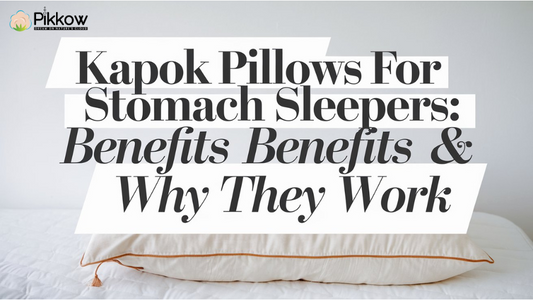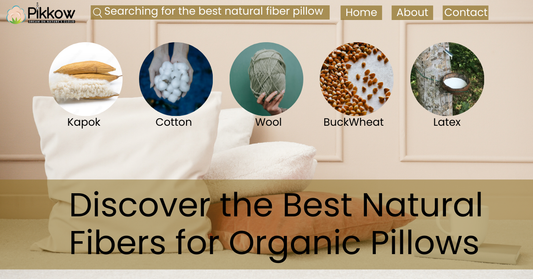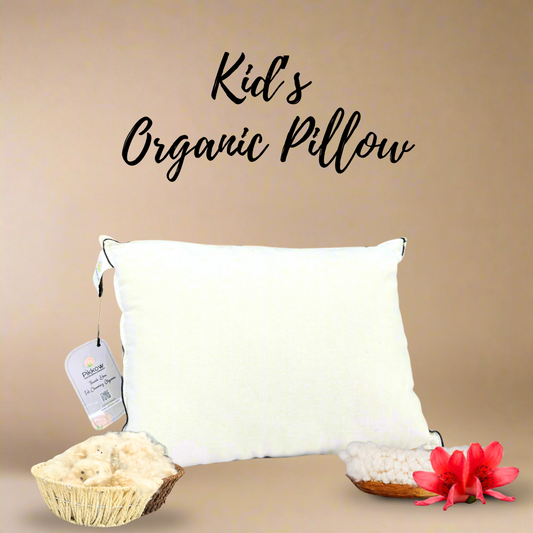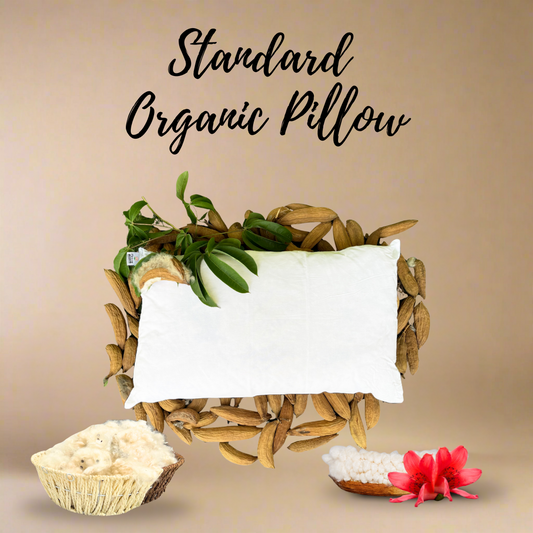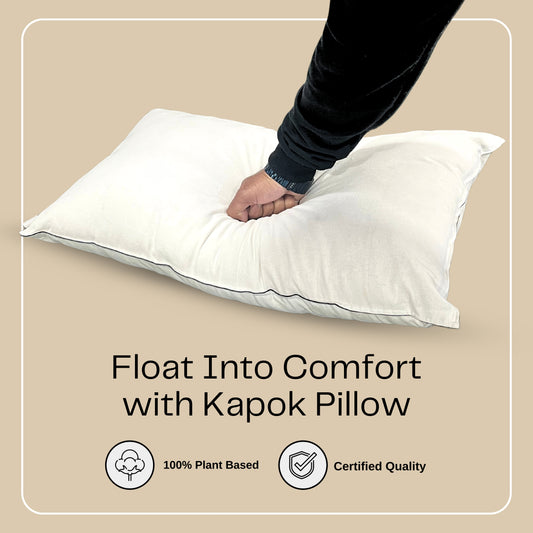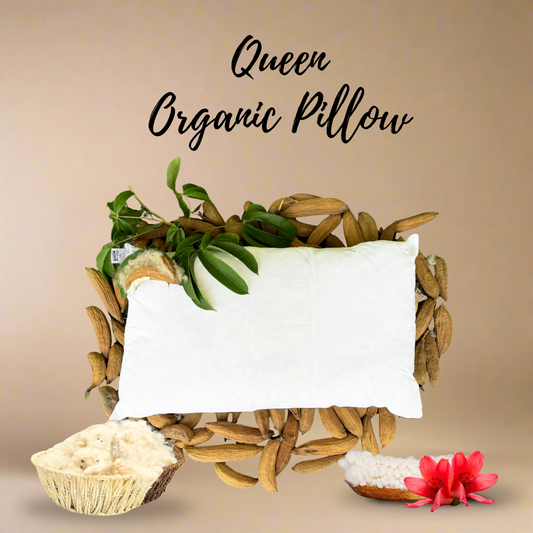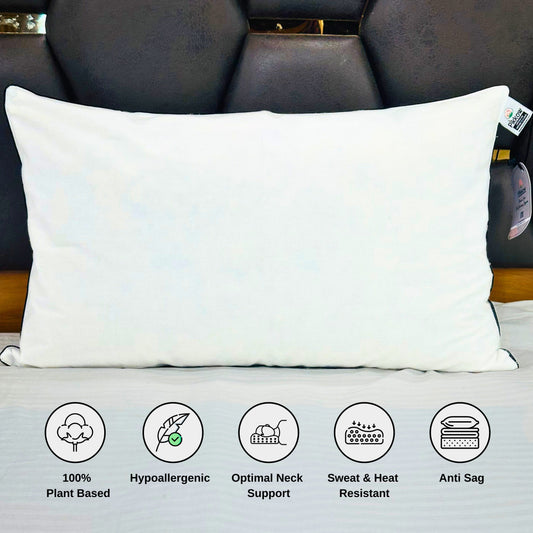Have you ever woken up after eight hours of sleep yet felt tired, foggy, or strangely uneasy? It’s not just about how long you sleep — it’s also about how clean your sleep is.
In today’s fast-paced world, our minds are constantly overstimulated. We detox our diets and declutter our homes, yet overlook one of the most intimate spaces of our lives — our beds. The concept of clean sleep psychology explores how the materials surrounding you at night can impact your emotions, mental clarity, and stress levels.
From your pillow filling to your bedsheet fibers, your sleep environment has a profound psychological influence. When your body rests on natural, toxin-free materials like organic Kapok pillows, your nervous system relaxes more deeply. Your breath slows, your mind unwinds, and your body perceives safety — the foundation of true rest.
Let’s explore how natural materials contribute to not just physical comfort but also emotional wellbeing, and why Indian families are shifting toward brands like PIKKOW for a truly mindful and healthy sleep.
What Is Clean Sleep Psychology?
Clean sleep psychology refers to the connection between your sleep environment and your mental state. It combines the science of sleep hygiene with the emotional benefits of minimalism, sensory comfort, and eco-conscious living.
Simply put — the cleaner your sleep environment (physically and chemically), the calmer your mind becomes.
It’s not just about washing your sheets; it’s about choosing bedding made from natural fibers that don’t release toxins, irritate your skin, or disrupt your body’s natural rhythm.
Key Elements of Clean Sleep Psychology:
-
Natural touch: Organic fibers soothe the nervous system.
-
Breathability: Proper airflow prevents restlessness and sweating.
-
Toxin-free bedding: Reduces chemical exposure that can affect mood and health.
-
Mindful sleep habits: Slowing down and creating a sanctuary for rest.
When your sleep setup aligns with your body’s natural rhythms, you sleep deeper and wake up emotionally lighter.
The Emotional Impact of Natural Sleep Environments
Your brain associates certain sensations with safety and calm. Harsh artificial fabrics or synthetic pillows can subconsciously trigger mild tension or restlessness. In contrast, natural materials like Kapok, organic cotton, and linen activate a sense of comfort and groundedness.
According to environmental psychology, touch and scent play huge roles in emotional regulation. Sleeping on natural materials engages these senses in a way that reinforces relaxation.
Psychological Benefits of a Natural Sleep Environment
-
Reduces Stress:
Natural textures like Kapok fiber and cotton activate the parasympathetic nervous system — your “rest and digest” mode. This reduces stress hormones like cortisol.
-
Improves Sleep Quality:
Breathable, toxin-free bedding supports temperature balance, preventing overheating that can cause night awakenings.
-
Enhances Emotional Balance:
Clean, natural scents and soft textures promote serotonin production, helping regulate mood and anxiety.
-
Promotes Mindful Sleep Rituals:
Choosing eco-friendly bedding encourages you to slow down, make intentional choices, and engage in mindful sleep practices that extend beyond the bedroom.
Toxin-Free Bedding: The Hidden Key to Mental Peace
Most conventional pillows and mattresses are made of polyester, memory foam, or synthetic blends that off-gas chemicals such as formaldehyde and volatile organic compounds (VOCs). These toxins can irritate your skin, disrupt hormones, and subtly affect your mood and focus.
By contrast, toxin-free bedding — made from materials like Kapok fiber, organic cotton, or natural latex — fosters a cleaner environment for your body and mind.
Think of it like breathing fresh mountain air versus city smog — your body knows the difference, even when you don’t.
Why Toxin-Free Bedding Supports Clean Sleep Psychology:
-
No synthetic off-gassing that impacts brain chemistry.
-
Prevents microplastic exposure that can trigger skin irritation and stress.
-
Encourages better airflow and oxygenation during sleep.
-
Strengthens the mental association of safety and relaxation in your bedroom.
This is why organic Kapok pillows, such as those from PIKKOW, are fast becoming a household essential in India’s wellness-conscious homes.
The Science of Natural Touch and the Mind
Touch is one of the most primal forms of emotional communication. When your skin touches organic fabrics, it sends a sensory message to your brain: “You’re safe.”
Synthetic fibers, however, can generate static electricity, trap heat, and feel artificial — stimulating alertness rather than calm. Over time, these subtle discomforts can prevent your nervous system from reaching a true rest state.
Sleeping on a natural pillow with a soft Kapok filling reduces friction, balances temperature, and gives a feather-light cushioning that soothes your neck and shoulders. This sensory harmony contributes directly to clean sleep psychology, helping your body relax fully — emotionally and physically.
Mid-Blog Highlight: How PIKKOW Pillows Promote Clean Sleep Psychology
PIKKOW’s organic Kapok pillows are designed around the principle that nature heals best. Every pillow is:
-
Handcrafted with sustainably sourced Kapok fiber — light, hypoallergenic, and breathable.
-
Covered in GOTS-certified organic cotton for a toxin-free touch.
-
Completely chemical-free, ensuring safe, allergen-free sleep for all ages.
-
Designed for mindful sleep — soft enough to cradle, supportive enough to align.
Each PIKKOW pillow is not just a bedding accessory; it’s a mindful investment in your mental well-being. Sleeping on something pure and natural builds a subconscious association of calm, cleanliness, and self-care — the essence of clean sleep psychology.
How to Create a Natural Sleep Environment at Home
Transforming your bedroom into a tranquil, natural sleep environment doesn’t require a full makeover. Small changes can shift your energy and mindset dramatically.
Simple Tips for Mindful, Clean Sleep:
|
Change |
Why It Works |
|
Switch to Organic Bedding |
Reduces exposure to synthetic chemicals and promotes deep rest. |
|
Use Kapok or Cotton Pillows |
Breathable, hypoallergenic, and naturally comforting. |
|
Keep Your Bedroom Clutter-Free |
Visual calm reduces mental stress. |
|
Add Plants or Natural Scents |
Improves air quality and emotional grounding. |
|
Unplug Before Bed |
Mindful sleep starts by reducing digital overstimulation. |
These intentional steps cultivate a sleep environment that mirrors nature’s balance — clean, calm, and emotionally restorative.
Why Clean Sleep Is the Future of Wellness in India
As more Indian consumers embrace sustainable and holistic living, clean sleep psychology is emerging as the next big step in personal wellness. Families are realizing that true health begins with what we touch and breathe while we rest.
PIKKOW is leading this revolution by offering products that are not only organic but emotionally comforting. Their handcrafted approach bridges traditional wisdom and modern mindfulness — helping households achieve cleaner, calmer, and more connected sleep experiences.
Conclusion: Rest Easy, Breathe Deep, Sleep Clean
Your sleep is not just about hours — it’s about harmony. When you sleep on natural, toxin-free materials, your body and mind synchronize into deep relaxation.
By embracing the principles of clean sleep psychology, you invite mental peace, emotional clarity, and true rest into your nightly routine.
So tonight, as you lay your head on your pillow, ask yourself:
Is your sleep environment nurturing your body — or exhausting your mind?
If it’s time for a change, start small. Choose a PIKKOW organic Kapok pillow, open your windows, and let your bedroom breathe again.
A clean pillow, a calm mind, and a restful night — that’s the power of sleeping naturally.
FAQs
1. What is clean sleep psychology?
Clean sleep psychology explores how toxin-free, natural materials create a calming sleep environment that supports emotional and mental well-being.
2. How do natural materials improve sleep quality?
Natural fibers like Kapok and cotton regulate temperature, prevent allergens, and reduce stress through sensory comfort.
3. What are the benefits of toxin-free bedding?
Toxin-free bedding prevents chemical exposure, promotes better breathing, and enhances relaxation during sleep.
4. Are Kapok pillows suitable for people with allergies?
Yes, Kapok is naturally hypoallergenic and anti-microbial — perfect for allergy-sensitive sleepers.
5. How can I create a mindful sleep environment?
Use organic bedding, minimize clutter, and adopt relaxing pre-sleep rituals like reading or deep breathing to encourage mindful sleep.


